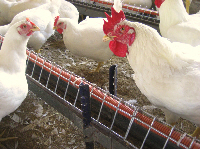



Exclusion Grilles: Key to Good Manners
UK - The use of exclusion feeders in the broiler breeder house is now essential for male and female body weight control throughout production, according to Aviagen.Good manners make for better results. When it comes to poultry encouraging both males and females to have good feeding manners through the use of well-maintained separate sex feeding equipment is a vital tool for securing good flock performance.

Mark Wright, Regional Technical Manager, Aviagen Asia Pacific, explained: “The use of exclusion feeders in the broiler breeder house is now essential for male and female body weight control throughout production. Feed stealing by either sex will have a significant impact on egg numbers and fertility within the flock.”
In the 2013 'Parent Stock Handbook', Aviagen increased the height and width recommendations for exclusion grills on female feeders to account for progress in genetics and bird performance. Recommended grill height is now 60mm (increased from 50-55mm) and width is 47mm (increased from 45-47mm). These increases will ensure females can access the feed while preventing the males from stealing feed.
Complete exclusion of all males from the female feeders normally occurs around 26 weeks of age. Up to this point, some males may still be able to access the female feeding system and steal female feed. Careful monitoring of bodyweight and feeding behaviour is necessary at this time to ensure that both males and females are receiving enough feed to maintain target increases in bodyweight.
Early in production, a plastic pipe can be inserted into the apex of the grill to exclude immature males. The plastic pipe can be removed after 33 to 35 weeks of age.
Feeding equipment must be properly adjusted and maintained; daily inspections of female feeders should be made. Poorly managed and badly maintained feeding equipment gives uneven feed distribution, which is a major cause of depressed egg production and fertility.
For more information, contact Aviagen by email [email protected] or its web site, www.aviagen.com.












